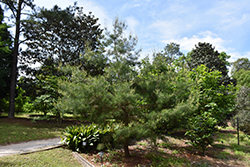It's all about ...
plants

Height: 80 feet
Spread: 40 feet
Sunlight:
![]()
Hardiness Zone: 9a
Description:
A majestic evergreen tree that is tall, erect, and long lived, with a single trunk; conical when young, then develops a rounded crown with age; whorls of blue-green needles that are long and graceful; a great landscape feature tree
Ornamental Features
Montezuma Pine is primarily valued in the landscape for its decidedly oval form. It has attractive bluish-green evergreen foliage. The large needles are highly ornamental and remain bluish-green throughout the winter. The brown fruits are held in cones from late summer to late spring. The fruit can be messy if allowed to drop on the lawn or walkways, and may require occasional clean-up.
Landscape Attributes
Montezuma Pine is a dense evergreen tree with a strong central leader and a shapely oval form. Its relatively fine texture sets it apart from other landscape plants with less refined foliage.
This is a relatively low maintenance tree. When pruning is necessary, it is recommended to only trim back the new growth of the current season, other than to remove any dieback. It is a good choice for attracting squirrels to your yard. It has no significant negative characteristics.
Montezuma Pine is recommended for the following landscape applications;
- Accent
- Shade
Planting & Growing
Montezuma Pine will grow to be about 80 feet tall at maturity, with a spread of 40 feet. It has a low canopy with a typical clearance of 5 feet from the ground, and should not be planted underneath power lines. It grows at a slow rate, and under ideal conditions can be expected to live to a ripe old age of 120 years or more; think of this as a heritage tree for future generations!
This tree should only be grown in full sunlight. It is very adaptable to both dry and moist growing conditions, but will not tolerate any standing water. It is considered to be drought-tolerant, and thus makes an ideal choice for xeriscaping or the moisture-conserving landscape. It is not particular as to soil type or pH. It is somewhat tolerant of urban pollution. This species is not originally from North America.
This plant is not reliably hardy in our region, and certain restrictions may apply; contact the store for more information.
